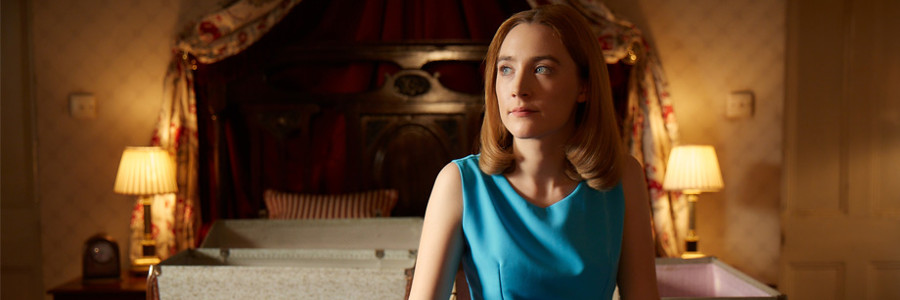In 1962, the United Kingdom was on the precipice of cultural revolution. As the post-war gloom finally began to fade in the wake of social and economic boom, the Swinging Sixties took hold of the nation, and altered the popular consciousness in fundamental and liberating ways.
It is on this precipice that On Chesil Beach, the newly-released drama based on Ian McEwan’s 2007 Booker Prize nominee of the same name, takes place . A simple story with heartfelt themes, it follows two virgin newlyweds, Florence (Saoirse Ronan) and Edward (Billy Howle) as they attempt to consummate their marriage at a seaside hotel. Despite their differences in personality and class, the two are very much in love, but stifling social code makes it difficult to communicate their apprehensions. The conflict that results from this frustration soon boils to a climax; one that will have a severe impact on their future.
Set mostly in the hotel room, and dialogue-heavy flashback, On Chesil Beach feels better suited to the stage than the screen, but first-time film director Dominic Cooke (an acclaimed Olivier Award-winning theatre director) and cinematographer Sean Bobbitt (12 Years a Slave) do their best to infuse the film with cinematic energy. They succeed to an extent – they certainly manage to capture the awkward tension of the situation – but the reliance on repetitious shots of nervously-bouncing feet or stunted kisses do start feeling heavy-handed.
This can be mostly ignored thanks to the strong performances of the leads. Howle is appropriately subtle in his portrayal of the studious but rash Edward, whose (mostly failed) attempts to act cool are designed to mask his working-class upbringing. Ronan, as Florence, is outstanding. Passionate, witty, professional, the upper-class Florence is a notably deeper character than her husband, and Ronan captures her complexity with the same masterful ability she has steadily been developing since her role in another McEwan adaptation, 2007’s Atonement.
What cannot be ignored, however, is a final act that extends beyond the ending of the novella, and subsequently spoils the potency of On Chesil Beach‘s themes. One of the trickier aspects of adapting a book to film is staying true to the heart of the story even as elements are manipulated and massaged into the new medium. With McEwan himself writing the screenplay, it seemed that the integrity of On Chesil Beach’s themes would be maintained.
The opposite proves true as the film jumps ahead in time, first to 1975, then 2007, to reveal Florence and Edward’s futures. Woefully bad old-age makeup aside, the film’s most blatant error is its decision to give audiences too much detail about what happens when the pair leave Chesil Beach. The air of uncertainty surrounding the ending of the novella is what makes it work, but it is now gone. Compounded by the inclusion of a scene that directly states why the consummation of the marriage is particularly difficult for Florence (a moment that is so subtly hinted at in the novella that McEwan said it didn’t matter whether readers picked up on it or not), the misstep turns the tale on its head.
Two decades ago, when McEwan was writing original screenplays, he was asked whether he would adapt his books to film. He said no. That the process would be like ripping his own guts out. But now he’s done it, and it’s the book’s guts that have been lost in the process.
That is not meant to discredit McEwan as a screenwriter – he’s also adapted this year’s The Children Act, which fairs much better. Instead, it proves how unsuitable On Chesil Beach is for cinema.
On Chesil Beach is not a story about sex. Sex is the context for the true theme: how culture suppresses people’s ability to communicate honestly. Portraying the repressed, nervous minds of two young newlyweds as they sat across from each other at a dinner table without over-communicating to the audience was always going to be a challenge.
Despite strong performances, wonderful production design, and some moving cinematography, it’s not a challenge that On Chesil Beach manages to overcome.
—
On Chesil Beach is in Australian cinemas now.

